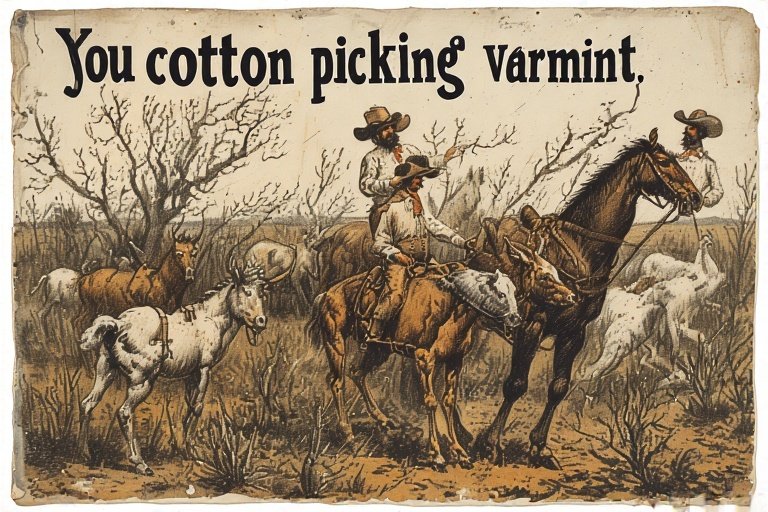
Understanding the Phrase "You Cotton Picking Varmint": Origins, Usage, and Cultural Impact
The phrase you cotton picking varmint is a colorful expression rooted in American vernacular, often evoking a sense of playful reprimand or lighthearted insult. While it may sound quirky or outdated to modern ears, its historical and cultural significance makes it a fascinating subject. This article dives deep into the origins, meanings, and contemporary relevance of you cotton picking varmint, exploring its linguistic charm and why it continues to capture attention.
The Origins of “You Cotton Picking Varmint”
The phrase you cotton picking varmint has its roots in the American South, particularly tied to the region’s agricultural history. The term “cotton picking” refers to the labor-intensive process of harvesting cotton by hand, a task historically associated with the rural South and the era of slavery and sharecropping. Meanwhile, “varmint” is a colloquial term for a troublesome or mischievous creature, often used to describe pests like rodents or, in a playful human context, someone acting naughty or bothersome.
When combined, you cotton picking varmint becomes a vivid insult, implying someone is both troublesome and perhaps tied to the low-status work of cotton picking. Its earliest documented uses appear in mid-20th-century American pop culture, particularly in Westerns and cartoons, where it was used to add a folksy, humorous flair to dialogue.
Linguistic Breakdown of the Phrase
Let’s break down you cotton picking varmint to understand its components:
- You: A direct address, making the phrase personal and pointed.
- Cotton Picking: An adjective phrase that, in this context, serves as an intensifier, adding regional flavor. It’s akin to saying “darned” or “blasted” but with a specific historical connotation.
- Varmint: A term borrowed from “vermin,” used affectionately or derisively to describe someone causing trouble.
Together, you cotton picking varmint paints a picture of someone who’s a bit of a rascal, often said with a smirk rather than genuine malice. Its rhythmic quality and vivid imagery make it memorable and fun to say.
Cultural Significance in Media and Entertainment
The phrase you cotton picking varmint gained prominence through its use in American media, particularly in the mid-20th century. It was a staple in Western films and television shows, where characters like cowboys or sheriffs might sling it at outlaws or mischievous kids. For example, in classic Looney Tunes cartoons, characters like Yosemite Sam would shout you cotton picking varmint at Bugs Bunny, cementing its place in pop culture.
This phrase’s popularity in media wasn’t just about humor; it reflected a broader fascination with the American South’s linguistic quirks. By using you cotton picking varmint, writers added authenticity to characters, grounding them in a specific time and place. The phrase’s exaggerated tone also made it perfect for comedic effect, ensuring its staying power in the cultural lexicon.
Historical Context: Cotton Picking and Its Weight
To fully appreciate you cotton picking varmint, we must acknowledge the historical weight of “cotton picking.” Cotton was a cornerstone of the American South’s economy, but its production relied heavily on enslaved labor before the Civil War and later on sharecroppers, many of whom were African Americans. Referring to someone as a you cotton picking varmint could, in certain contexts, carry a derogatory undertone, implying low social status or menial labor.
However, in its pop culture usage, the phrase was typically stripped of these darker connotations, used instead as a lighthearted jab. Still, modern users of you cotton picking varmint should be mindful of its historical baggage, ensuring it’s used in contexts that avoid insensitivity.
Why “You Cotton Picking Varmint” Endures
The staying power of you cotton picking varmint lies in its versatility and charm. It’s a phrase that can be used in jest among friends, in nostalgic references to classic media, or even as a quirky way to express frustration. Its unique combination of specificity (cotton picking) and generality (varmint) makes it adaptable to various situations. Whether you’re playfully scolding a sibling or quoting a favorite cartoon, you cotton picking varmint adds a dash of personality to your words.
Moreover, the phrase’s rhythmic cadence and alliteration make it inherently catchy. Linguistic studies suggest that phrases with strong rhythmic patterns, like you cotton picking varmint, are more likely to stick in our memories, contributing to their longevity.
Modern Usage: From Nostalgia to Niche
In today’s world, you cotton picking varmint is less common in everyday speech but retains a niche presence. It’s often used in retro-themed contexts, such as vintage-inspired merchandise, social media memes, or themed events celebrating mid-20th-century Americana. For instance, a quick search on platforms like X reveals fans of classic cartoons sharing clips of Yosemite Sam yelling you cotton picking varmint, keeping the phrase alive in digital spaces.
The phrase also appears in creative writing or dialogue to evoke a specific tone. Authors might use you cotton picking varmint to give characters a Southern or old-timey flair, instantly transporting readers to a dusty Western town or a Looney Tunes-inspired world. Its rarity in modern conversation only adds to its charm, making it a delightful surprise when it pops up.
Sensitivity and Context: Using the Phrase Today
While you cotton picking varmint is generally seen as harmless in its pop culture context, sensitivity is key when using it today. The phrase’s connection to cotton picking, and by extension to the history of slavery and exploitation, means it could be misinterpreted in certain settings. If you’re tempted to call someone you cotton picking varmint, consider the audience and context to avoid unintended offense.
For example, using you cotton picking varmint in a playful, nostalgic setting—like a themed party or among fans of classic cartoons—is likely fine. But in professional or diverse settings, it’s wise to opt for less historically charged phrases to avoid misunderstanding.
Fun Ways to Incorporate “You Cotton Picking Varmint”
If you’re charmed by you cotton picking varmint and want to weave it into your life, here are some fun ideas:
- In Conversation: Use you cotton picking varmint to playfully scold a friend who’s being mischievous, like when they steal the last cookie.
- In Writing: Add it to a short story or script to give a character a quirky, Southern vibe.
- On Social Media: Share a meme or GIF featuring you cotton picking varmint to connect with others who love retro pop culture.
- At Themed Events: Break out you cotton picking varmint at a Western-themed party or cosplay event for authentic flair.
By keeping the tone light and the context appropriate, you can enjoy the phrase’s charm without stepping on toes.
The Phrase in Popular Culture Today
Though you cotton picking varmint peaked in the mid-20th century, it still pops up in modern media. Shows like The Simpsons or Family Guy might reference it for comedic effect, banking on its nostalgic appeal. Online, fans of vintage animation keep you cotton picking varmint alive through fan art, YouTube compilations, and social media posts.
Interestingly, the phrase has also inspired merchandise, from T-shirts to mugs emblazoned with you cotton picking varmint, proving its enduring marketability. Its ability to evoke a specific era while remaining versatile ensures it remains a beloved piece of linguistic history.
Conclusion
The phrase you cotton picking varmint is more than just a quirky insult; it’s a window into American history, pop culture, and linguistic creativity. From its roots in the cotton fields of the South to its iconic role in cartoons and Westerns, you cotton picking varmint has left an indelible mark on the cultural landscape. While its use today requires sensitivity due to its historical connotations, it remains a charming, nostalgic expression that can add flair to conversations and creative projects.
Whether you’re a fan of classic cartoons, a lover of linguistic oddities, or just someone who enjoys a good playful jab, you cotton picking varmint is a phrase worth knowing. By understanding its origins and using it thoughtfully, you can keep this delightful piece of Americana alive for future generations.
FAQs
Q: What does “you cotton picking varmint” mean?
A: You cotton picking varmint is a playful insult from American English, implying someone is mischievous or troublesome. It combines “cotton picking,” a reference to manual cotton harvesting, with “varmint,” a term for a pesky creature or person.
Q: Where did the phrase “you cotton picking varmint” come from?
A: The phrase originated in the American South, tied to the region’s cotton industry. It gained popularity in mid-20th-century media, especially Westerns and cartoons like Looney Tunes, where it was used for comedic effect.
Q: Is it okay to use “you cotton picking varmint” today?
A: While you cotton picking varmint is generally seen as lighthearted, its reference to cotton picking can evoke sensitive historical connotations. Use it in playful, nostalgic contexts and avoid it in professional or diverse settings to prevent misunderstanding.
Q: Why is “you cotton picking varmint” associated with cartoons?
A: The phrase was popularized by characters like Yosemite Sam in Looney Tunes, who used you cotton picking varmint to scold others humorously. Its exaggerated tone and Southern flair made it a perfect fit for animated comedy.
Q: Can I use “you cotton picking varmint” in writing?
A: Absolutely! You cotton picking varmint can add a fun, retro vibe to creative writing, especially for characters with a Southern or old-timey personality. Just ensure the context is appropriate to avoid unintended offense.






